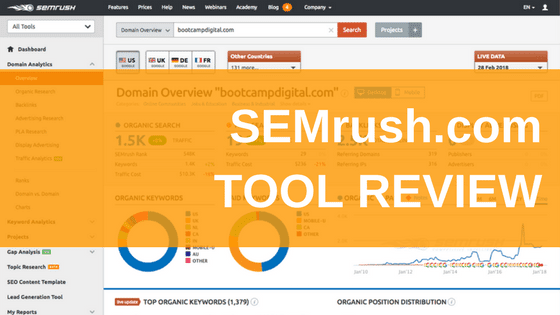SEMrush.com is a great tool for keyword research and competitive analysis. We love it so much, in fact, that we built a training video for this tool. Keyword research is a critical task in SEO, and when you identify the right keywords to focus your content around, you can significantly impact your visibility and quality traffic to your website.
The internet is a competitive marketplace, because you’re not just competing with your local businesses who are direct competitors, but you are competing with every other web page that has similar keywords as you… and there are billions of web pages in the Google search index! Gaining insight into what your competitors are doing can help you save time, money, and focus in on the activities that will bring you the best results.
SEMrush.com is a tool that can do this for you. Here are some highlights of what we love so much about this tool, and how we use it for keyword research and competitor analysis. For SEMRush training, be sure to check out our SEMrush.com tool review in our Digital Marketing Tools Training on Boot Camp Institute.
- Analysis of our own site. There is a ton of data that you can discover about your own site, to measure how effective your SEO efforts are.
- View your estimated traffic over time. If you’ve been consistently working on SEO tactics, then your organic search traffic should show an increase over time.
- View the keywords that you’re ranking for. Google Analytics stopped providing keyword data, but that didn’t stop our curiosity for what keywords we’re ranking for. If you’ve built content for a topic, it’s super helpful to know if that content is ranking and attracting traffic. This tool will show you what keywords you rank for.
- View your ranking position change over time for your keywords. Again, it’s super helpful to know if what you’re doing is working, and this tool allows you to monitor your keywords and the ranking position over time. So you know if the content you optimized is helping you rank better or not.
- Identify your top organic search competitors. Your actual competitors in “real life” could be very different than those online. When we talk about competition in the search engines, we’re referring to every website that ranks at the top of search for the same keywords you want to rank for. With this tool, not only can you identify who your most likely competitors are, but you can identify common keywords among the top competing sites. You may uncover keywords that your competitors are all ranking for, that you haven’t even considered creating content for yet!
- Analysis of your competitors. What is working for your competitors and what can you learn from them and apply to your own plan?
- Find out what keywords your competitors are ranking for. They may be targeting keywords that you haven’t thought of yet, and you can add those keywords to your own list.
- Find out what pages are performing best on competitor’s sites. You can discover what content is ranking and driving traffic. From there, you may uncover new opportunities to optimize existing content by including better keywords that are working for your competition, or you may find opportunities to create even better content!
- Keyword Magic Tool. This tool is so cool, they had to use the word “Magic” when they named it. You can enter any keyword and discover new topics that are related to that keyword. This is great for discovery of long tail keyword terms that would be easier to rank for and could potentially drive higher converting traffic.
- PPC Competitor Analysis. Have you ever seen AdWords (ads that appear at the top of the Google search results) for your competition and wished you could take a peek into their account? With SEMrush.com you can get some pretty cool insights on the keywords they are using, and the ads they are running. With this tool, you may discover that a competitor ran ads for a few months for a keyword but then stopped running the ads. This is a valuable insight because maybe those keywords didn’t convert well for them, and that’s why they stopped bidding on them. Learn from their data and save yourself the time and money of running the same test to get the same results!
- SEO Content Template. In our SEO course, we teach you to analyze the top ranking sites for your keywords and try to determine the averages (number of total words, keywords, links, etc.) so that you can plan your own content and link building strategies. As you can imagine, doing that manually is very time consuming. This tool analyzes the top 10 rankings for a keyword and gives you recommendations on keywords to use in your content, total word count, link opportunities, and may even suggest that you add a video to your home page because the top ranking sites all have videos.
If you are doing SEO or PPC (AdWords) for your business, then SEMrush.com is a tool that will make your efforts much more efficient and effective. They have a free version, but it limits the number of results shown and some of the features you can use. If you manage SEO or PPC for multiple sites, or if you are serious about being super successful with your SEO and/or PPC campaigns, then the paid version of this tool is a wise investment.


















